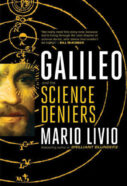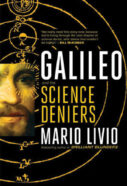Galileo and the Science Deniers
Mario Livio
Simon & Schuster, $28
In basketball, legends are often known by first name alone: LeBron, Kobe, Michael. Same with entertainers: Madonna, Cher, Beyoncé.
But lists of scientific legends almost always include surnames, never just Isaac or Albert or Charles. Among the titans of modern scientific lore, only one is generally referred to exclusively by a first name: Galileo.
The man had a last name: Galilei. But fewer people know his surname than know he was one of the primary founders of modern science. Galileo merged mathematics with natural philosophy and quantitative experimental methodology to provide a foundation for understanding nature on nature’s terms, rather than Aristotle’s.
Galileo’s life has been well-documented. Dozens of biographies have been written about him since the first by Vincenzo Viviani, published in 1717 (but composed before Thomas Salusbury’s English language Galileo biography of 1664). As recently as 2010, two major scholarly biographies (by David Wootton and John Heilbron) analyzed Galileo’s life and science in great depth.
But with the lives of legends, there is always a license to produce yet another interpretation. In Galileo and the Science Deniers, astrophysicist Mario Livio has invoked that license to tell Galileo’s story once more, this time with a particular concern for Galileo’s relevance to science today (and the impediments to its acceptance). “In a world of governmental antiscience attitudes with science deniers at key positions,” Livio writes, “Galileo’s tale serves … as a potent reminder of the importance of freedom of thought.”
Livio also set out to produce a biography more accessible to a general reader than the typical scholarly tomes. And he succeeded. His commentaries comparing Galileo’s time to today’s are weaved into an engagingly composed and pleasantly readable account.
In Livio’s view, today’s deniers of climate change science or the validity of evolutionary theory are comparable to the religious opponents of Galileo’s scientific views, particularly his insistence on the motion of the Earth around the sun. Serving that end, the book is not an in-depth biography as much as a summary of Galileo’s life and science, plus a thorough recounting of the events leading up to his famous trial. Livio plays the role of a highly capable legal commentator in analyzing the issues raised during the trial, including discussion of the questionable tactics by the prosecution and Galileo’s not always effective defense.
Galileo’s trial centered on his book Dialogue Concerning the Two Chief World Systems, in which three characters discuss the pros and cons of the Aristotelian cosmos, with Earth at the center, and the sun-centered solar system advocated by Copernicus. Galileo thought his book had been approved by the proper censors. But his enemies orchestrated heresy charges. Galileo’s book, the prosecution alleged, defied a Catholic Church order in 1616 forbidding him from advocating Copernicanism. Galileo’s argument that his book merely described the opposing views without affirming either side was rejected; he was convicted and sentenced to house arrest for the rest of his life.
Livio’s account of this well-known story is enhanced by insights drawn from more recent scholarship, including the discovery in 1998 of a letter written during the trial suggesting that a plea bargain might have been considered. Of particular interest is Livio’s account of a Galileo biography written by Pio Paschini, commissioned in the 1940s by the Pontifical Academy of Sciences, supposedly to explain how the Catholic Church had not really persecuted Galileo, but helped him. Instead, Paschini’s manuscript told the truth, so the church refused to publish it. In the 1960s, after Paschini’s death, the church relented, authorizing publication — but only after revisions that bowdlerized the original version to portray the church in a more favorable light.
Today, of course, science and religion still encounter tensions. But most recently, opposition to science has emerged as a more general public attitude, driven most prominently by climate science deniers and antivaccine propagandists. At times, Livio’s comparisons of such movements to opposition to Galileo seem a bit of a stretch. But in its essence, his point is on target. In particular, he assails a common misinterpretation of the Galileo lesson: that the minority view should be considered correct. Some climate change deniers, Livio notes, argue that the majority opposed Galileo, even though he turned out to be right; therefore minority views on climate change, though mocked by the majority, will also turn out to be right. But such reasoning is deeply flawed. “Galileo was right not because he had been mocked and criticized but because the scientific evidence was on his side,” Livio rightly declares.
As Paschini had written in his censored manuscript, Galileo presented a fair account of the scientific evidence for the Aristotelian and Copernican views of the universe. Paschini argued, as Livio notes, that “it wasn’t Galileo’s fault … that Copernicanism appeared much stronger.” Then as now, some scientific cases are stronger than others. Sadly, now as then, the stronger scientific case does not always sway the policy of the authorities — as the U.S. government’s response to the current pandemic illustrates. In the end, Galileo’s case was strong enough to survive. So his story is worth retelling.
Buy Galileo and the Science Deniers from Amazon.com. Science News is a participant in the Amazon Services LLC Associates Program. Please see our FAQ for more details.


 Sanford Burnham Prebys Medical Discovery Institute has been awarded a $4.5 million grant from the National Institutes of Health (NIH) to identify new therapies for mental health disorders. The research will be headed by Layton Smith, Ph.D., and Michael Jackson, Ph.D., of the Institute’s Conrad Prebys Center for Chemical Genomics. The funding supports the discovery of new classes of drugs that target “orphan” receptors to treat psychological conditions such as schizophrenia, depression, anxiety and substance abuse.
Sanford Burnham Prebys Medical Discovery Institute has been awarded a $4.5 million grant from the National Institutes of Health (NIH) to identify new therapies for mental health disorders. The research will be headed by Layton Smith, Ph.D., and Michael Jackson, Ph.D., of the Institute’s Conrad Prebys Center for Chemical Genomics. The funding supports the discovery of new classes of drugs that target “orphan” receptors to treat psychological conditions such as schizophrenia, depression, anxiety and substance abuse. Johns Hopkins researchers have demonstrated that behavior therapy that exposes people to memories of their trauma doesn’t cause relapses of opioid or other drug use, and that PTSD severity and emotional problems have decreased after the first therapy session.
Johns Hopkins researchers have demonstrated that behavior therapy that exposes people to memories of their trauma doesn’t cause relapses of opioid or other drug use, and that PTSD severity and emotional problems have decreased after the first therapy session. Tufts awards seed funding to 8 projects that seek to address the complex individual & community challenges wrought by the opioid epidemic. The inaugural awards of the Tufts Initiative on Substance Use and Addiction demonstrate a multidisciplinary drive to address this pressing public health crisis.
Tufts awards seed funding to 8 projects that seek to address the complex individual & community challenges wrought by the opioid epidemic. The inaugural awards of the Tufts Initiative on Substance Use and Addiction demonstrate a multidisciplinary drive to address this pressing public health crisis.